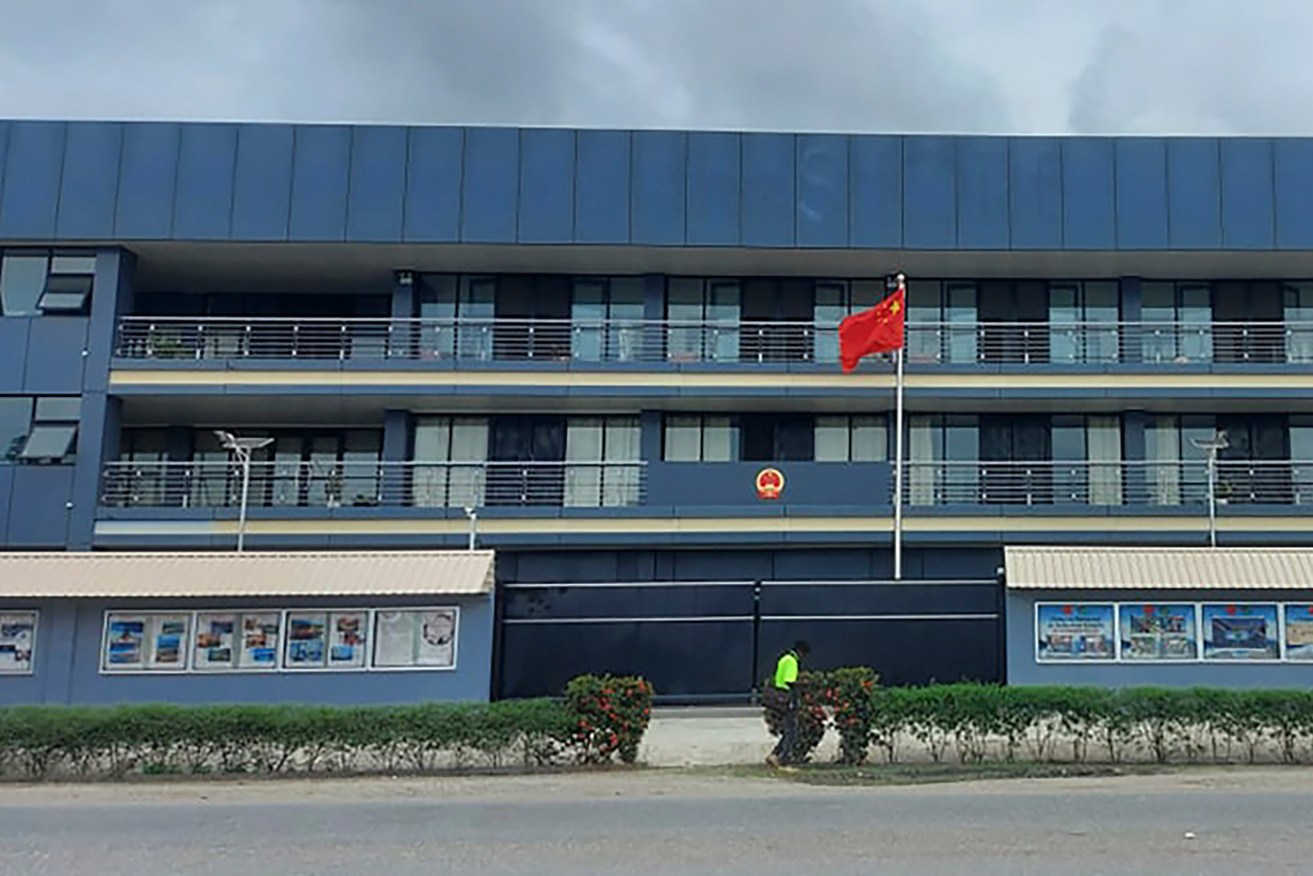Australia reacts to foreign policy ‘failure’ of China security pact
China’s entering a security pact with the Solomon Islands has prompted a war of words in Canberra, with Labor branding it Australia’s worst foreign policy failure in the Pacific since World War Two.

China's embassy in Honiara, Solomon Islands. Photo: AP/Charley Piringi
Foreign affairs spokeswoman Penny Wong says a Chinese security agreement with a nation 1600 kilometres from Cairns has made the region less secure.
“On Scott Morrison’s watch our region has become less secure and the risks that Australia faces have become much greater,” Wong said.
“The government should have acted sooner. We live in a world where the strategic circumstances we face are riskier and more uncertain than in any time since the end of World War II.”
China will likely move fast to increase its presence in the Pacific after signing the pact, according to one senior analyst.
While China has ruled out establishing a military base in the Solomons, there is a risk Beijing will establish a “military base by stealth” in the next one to two years, Australian Strategic Policy Institute’s Malcolm Davis says.
“The Chinese are a powerful player and once they get a presence, an influence in a country, it’s virtually impossible to get them out,” he told the Nine Network.
“I think the Chinese are going to move very fast. Because they will want to achieve a foothold there. Principally to cut Australia off from a key sea-land communication with the United States.”
Davis says Australia should have shown more diplomacy with the Solomon Islands and other Pacific Island nations.
“There has been a failure in diplomacy,” he said.
“But it’s important to note that whilst we attempt to support development in the Pacific Island states, the Chinese come in with bags of money and essentially buy out leadership and get what they want.”
Despite repeated assertions from the Solomon Islands that Australia remains its security partner of choice, Wong says the pact with China has demonstrated Canberra is no longer the go-to for Honiara.
“What this deal signifies is that Australia is no longer for the Solomon Islands a nation to whom they turn to meet their challenges in every instance,” she said.
Senior government minister David Littleproud has hit back at the opposition, saying leaders needed to act with restraint as the full extent of the deal is not yet known.
“No one has looked under the bonnet of how far it goes,” he said, while Foreign Minister Marise Payne said that criticism of the government doesn’t recognise the “the sovereign decisions that governments make for themselves”.
“It also doesn’t recognise the strength and the engagement that Australia has made through the Pacific step up,” she said.
“We are looking at very serious geo-strategic challenges in our region.”
The foreign minister expressed her deep disappointment in the signing of the security agreement when it was made public by the Chinese on Tuesday night.
Payne says Australia remains concerned about the lack of transparency regarding the agreement.
“This has not been agreed in an open and transparent way – not being consulted, for example, across the region,” she said.
“Security issues have been dealt with in a Pacific-wide manner, that’s the traditional approach for these issues, and that’s why some Pacific partners have also raised concerns.”
Pacific Minister Zed Seselja says Australia is not considering cutting its aid spending in retaliation to the announcement as Canberra continues to engage with the region.
Douglas Ete, chairman of Solomon Island Parliament’s public accounts committee, told fellow lawmakers that Chinese officials would arrive in mid-May to sign cooperation pacts.
Prime Minister Manasseh Sogavare told Parliament that a proposed security agreement would not include a Chinese military base.
Ete said the agreements would increase cooperation on trade, education and fisheries, but that he opposed the idea of allowing China to establish a military base.
In Washington, the White House, which is sending a high-level US delegation to the Solomons’ capital Honiara this week, said it was concerned about “the lack of transparency and unspecified nature” of the pact.
Australian officials said China appeared to want to pre-empt the arrival of the US delegation in Honiara, which the White House said would discuss concerns about China, as well as the reopening of a US embassy.
Chinese foreign ministry spokesma Wang Wenbin said the framework pact had been signed recently by State Councilor Wang Yi and Solomon Islands Foreign Minister Jeremiah Manele. He did not detail where or when the signing took place.
A spokesman for the White House National Security Council (NSC) said the reported signing “follows a pattern of China offering shadowy, vague deals with little regional consultation in fishing, resource management, development assistance and now security practices”.
The NSC later said the US would “intensify its engagement in the region to meet 21st-century challenges, from maritime security and economic development to the climate crisis and COVID-19”.
-with AAP




